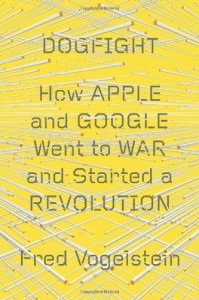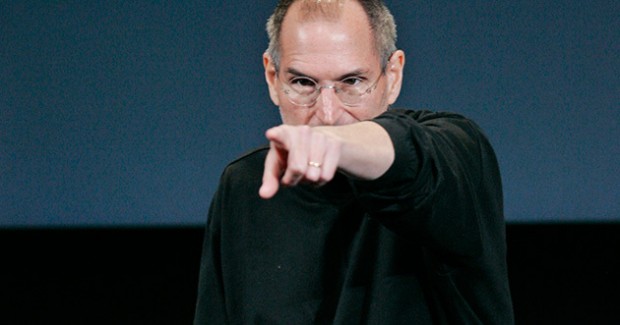Category: Book
Price: $19.81 hardcover
Back in early 2008, “Dogfight” author Fred Vogelstein wrote an article for Wired that still ranks as one of my favorites of recent years. Called “The Untold Story: How the iPhone Blew Up the Wireless Industry” Vogelstein told — with characteristic aplomb — the story of how the iPhone rose from top secret research project to industry-changing device. (Cult of Mac talked to Vogelstein about the iPhone wars in our interview.)
No doubt that article, along with Vogelstein’s other pieces of reportage over the past several years, made him long for a larger canvas upon which to tell not just the story of 21st-century Apple, but also its complex changing relationship with Google: a rivalry that Steve Jobs once predicted would end in nothing less than (hopefully metaphorical) “thermonuclear war.”
Vogelstein clearly recognizes the importance of this feud and observes that Apple vs. Google (or, more specifically, Apple vs. Android) is in this regard the latest era-defining tech rivalry: the successor to previous clashes of the titans including Apple vs. Microsoft in the 1980s, and Microsoft vs. Netscape was in the 90s. Like Bill Gates and Steve Jobs, Google and Apple started out as friends and allies, and one of the strands this book tugs on is the degree of collusion which existing between both companies as they pared down the competition, before eventually turning on each other.
“Vogelstein clearly recognizes the importance of this feud”
As companies, the differences between Apple and Google are both legion and fascinating. Although both grow out of the same libertarian Silicon Valley impulse, their mission statement and subsequent outlook on the world is very different. Apple, Vogelstein posits, has prospered because of its Jobsian focus on form and function; a company built by marketers. Google, on the other hand, is a company in thrall of engineers, whose “zaniness and embrace of chaos” makes it the ideological opposite of the ordered, secretive Apple.
With Apple as a Fordist company making physical products, and Google as an informational one specializing in search, if they were modest companies Google and Apple need never clash. But of course they aren’t, and their eventual collision is made inevitable by both companies’ ultimate mission statement of expanding to fill the role of operating systems of our lives — a one-stop tech shop of the type most recently explored in Dave Eggers’ latest novel “The Circle.”
It is the lack of this larger story — about what Apple and Google say about the modern digital world — that I felt most wanting in parts of “Dogfight.” Vogelstein tells the company vs. company narrative compellingly, but having introduced Apple and Google’s personalities — and then illustrated them with plenty of anecdotal tidbits, many taken from testimony given in the 2012 Samsung vs. Apple patent trial — he doesn’t always do enough to push the implications as far as he might. The disappointment of this is made all the more tangible by virtue of the fact that these “big picture” demands are exactly the thing that Wired (where Vogelstein presently works) typically does so well.
“There can be few who will fail to be gripped by the author’s ability to take potentially dry information and present it in the manner of a fast-moving cinematic narrative”
Whatever criticisms can occasionally be leveled at it, one thing that absolutely can’t be said about is that Wired fails to appreciate technology’s grand narrative — with every minuscule or infinitesimal advance lauded as part of an overall march toward a utopia staffed by machines of loving grace.
As companies that embrace their role as purveyors of digital ideology (Google’s promise to not be evil, compared with Apple’s stated desire to think different), both Apple and Google could be used as the vessels through which to explore the modern digital age; serving as a cliff notes primer on the big tech issues of the day — as well as its major players. At its best, “Dogfight” hints at this idea; stringing together the basis for a compelling argument as to why the smartphone and tablet should be “an inflection point, such as the moment when the PC was invented, when the Internet browser took hold, when Google reinvented web search, and when Facebook created the social network.”
That it doesn’t do this consistently most likely has as much to do with the book’s timing (coming very much in the midst of proceedings, before enough time has elapsed to draw overarching conclusions) as it does with Vogelstein’s (considerable) talents as a tech writer.
But if this is what “Dogfight” sometimes fails to do, what does it succeed at? Long-time Wired readers will know what to expect here. Although there are parts of the book where reader interest flags — such as a history of patent infringement suites that reads like an unnecessary excerpt from a first-year legal textbook — there can be few who will fail to be gripped by the author’s ability to take potentially dry information and present it in the manner of a fast-moving cinematic narrative à la “The Social Network.” These “character moments” and fun pieces of behind-the-scenes trivia proliferate. It hardly takes me to point out that Vogelstein has a great eye for detail — and he pulls out fun factoids from well-trodden ground, such as the fact that the iPhone building was labeled “Fight Club” on account of Apple’s secrecy and the fact that the first rule of Fight Club is that you don’t talk about Fight Club.
Ultimately, if there is a challenge to the book it might simply be the familiar one in today’s age of digital overload of too much available information. “The Untold Story: How the iPhone Blew Up the Wireless Industry” was published in 2008; less than a year after the iPhone made it to market. At the time, not only was the smartphone war a hot new topic, but there was still a slew of new details about its back story unfamiliar to most readers.
To paraphrase Dinah Washington, “what a diff’rence several years make.” Since then we have had Walter Isaacson’s well received (and widely read) Steve Jobs biography, as well as Steven Levy’s “In The Plex: How Google Thinks, Works and Shapes Our Lives” — to name just two of the volumes written about Apple and Google and the changing nature of digital media in general. As Vogelstein will know from his years of solid tech reporting, latecomers entering an entrenched marketplace can have difficulty cementing themselves, regardless of the quality of what they have on offer.
If you’re a regular consumer of tech news, or even one who glances, perhaps, just once a week at Cult of Mac or Cult of Android and has done with it (shame on you!), you’re still likely to know a lot of what is reported here. Because of Apple’s secrecy it is their side of the story (as opposed to Google’s) that likely holds the most tantalizing revelations and unsurprisingly this is the side that Vogelstein didn’t have ready access to, as he acknowledges in his afterword.
That’s not to say that you won’t get some value out of “Dogfight,” but it is likely the kind of “completist” value you might get from finding a deleted scene to a familiar film as opposed to uncovering a whole new narrative you didn’t know existed.
If you’re a tech newbie, on the other hand and are looking for a swift read that sums up the Google vs. Apple story in as to-the-minute detail as possible — and don’t want to pick up two books (Isaacson and Levy) which are now two years old — this book comes recommended. If you enjoy Vogelstein’s writing and want something that reads like an expanded Wired article (no bad thing in itself) this may be the book for you.
Just be aware that while it tells the story of battles, no one has yet won this particular war.
 Product Name: Dogfight: How Apple and Google Went to War and Started a Revolution Product Name: Dogfight: How Apple and Google Went to War and Started a RevolutionThe Good: Vogelstein can spin a compelling narrative out of potentially dry news events The Bad: Much of the information will already be well known to readers The Verdict A lively, if occasionally lacking, summary of the Google vs. Apple clash Buy from: Amazon.com |
[rating=good]
This post contains affiliate links. Cult of Mac may earn a commission when you use our links to buy items.
![Dogfight: How Apple and Google Went to War and Started a Revolution [Review] applevsandroid-e1294785453955](https://www.cultofmac.com/wp-content/uploads/2012/02/applevsandroid-e1294785453955.jpg)



